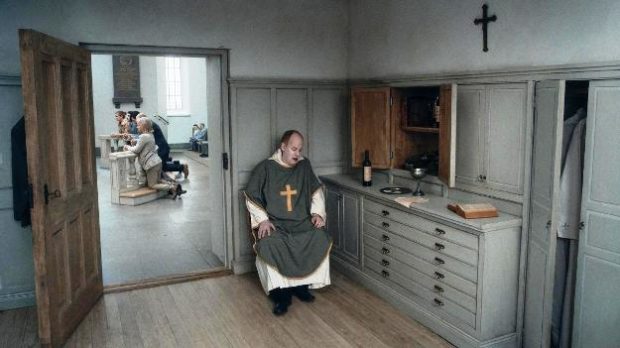
 The latest film by the darkly absurdist Swedish director Roy Andersson tackles the vexing subject of religion.
The latest film by the darkly absurdist Swedish director Roy Andersson tackles the vexing subject of religion.
Whenever I review a film by Roy Andersson, I feel like I have to prepare my audience again for how weird the work of this Swedish writer and director is. The style is consistent: his films are composed of discrete scenes in long takes with a stationary camera, and with spare looking sets illuminated by sharp color photography. The style matches the filmmaker’s vision. Andersson shows us an absurd human society struggling to find some kind of meaning in the midst of the worst situations, a struggle conveyed by a dark sense of humor that makes us laugh even as it presses its finger right on our wounds.
His new film is called About Endlessness. The style being the same doesn’t mean that it’s always the same subject. In this case, although we’re of course never told directly, a definite subject emerges. The first scene introduces a motif repeated later—two lovers are floating over the ruins of a city, like angels with arms entwined, against the background of lovely gray and white clouds. Can love, we wonder, float above the wreckage of human society, and from that vantage point glimpse an eternal truth? Next we see another couple on a park bench overlooking a city. “It’s September already,” says the woman in a gloomy voice. And so it goes. We are brought back down to time and its yearnings and discontents. Each little tableau offers a cryptic version of this contrast between transitory and eternal. Sometimes, to add to the distancing effect, a narrator explains the scene with a few words that don’t explain anything directly.
So what is the subject of About Endlessness? After awhile it becomes evident—at least it did to me—that Andersson is talking about religion and spirituality. The faulty moralism, wishful thinking, and misplaced love of ritual, but also the genuine need for meaning and purpose struggling to break through into people’s hearts. Each element in the film, from the grandiose to the insignificant, exposes this striving and this need in every aspect of so-called ordinary life.
The humor is bracingly sharp. My favorite part is a recurring story about a priest going to a psychiatrist for help, and the doctor with his casual comments unintentionally planting a seed of doubt in the priest’s mind. Later in the film the priest barges into the psychiatrist’s office in desperation, crying “I’ve lost my faith! My faith is gone! What should I do?” and the office secretary says, “I’m sorry, but we’re just about to close. Please come back on Monday.” The contrast between the sublimity of a man’s struggle to hold onto his faith in God, and the ridiculous rules and routines of ordinary life is a perfect summing up of Andersson’s sense of humor, which encompasses a sense of despair as well.
A woman with a baby carriage at a train station discovers that the heel of her shoe is broken. A man on a bus openly weeps, making the other passengers uncomfortable. A daydreaming waiter accidently overflows a customer’s wine glass. Andersson does not present the scenes like pieces of a puzzle—each is alone in its focus on the miniscule events of life against the background of a vast and unknowable reality. And just when you’re tempted to think that the film is striving for a kind of gentle humanism, Andersson gives the game away with a scene of Adolf Hitler in his bunker, trying to maintain a sense of dignity among his demoralized officers who can barely summon enough energy to give him a Nazi salute. At this point I had to laugh out loud at the film’s sheer audacity.
I realize that Andersson’s films are an acquired taste, not for everyone. (But after all, what is for everyone?) I still admire and enjoy each new movie, and this one, I have to say, most of all. At a crisp 76 minutes long, the title itself, About Endlessness, is also a joke, a rich and resonant joke about those ideas, the eternal questions, as they say, that have occupied humanity since, well, forever.






